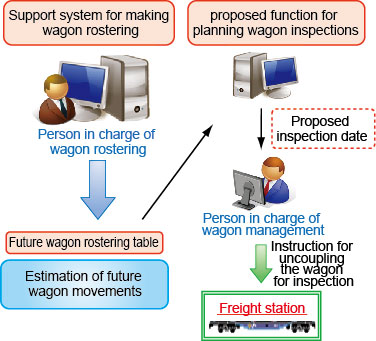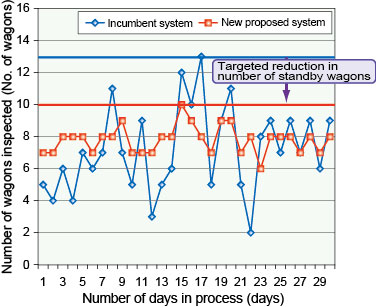2.Freight container car operation management support system
- A prototype system to support freight container car rostering has been developed.
- In order to forecast future container car activity, the tool to produce container car rostering tables also has been developed. Furthermore, the tool to suggest inspection schedules can help reduce the number of cars on standby.
Individual freight container cars (=wagons) can be used individually and on any section of lines. Consequently, it is impossible to determine inspection depots and it is difficult to make efficient inspection schedules. When a wagon approaches its mandatory inspection date, it must be uncoupled from the train. However it is difficult to forecast the movements of over 8,000 individual wagons, and so the approach practiced today is to check each wagon on each train when the train arrives at a station and uncouple the relevant wagons for inspection where appropriate. Nevertheless, the days on which freight trains arrive at a station and the number of wagons which need to be withdrawn from service for inspection on each occasion is not stable, and there are vast variations in work load among inspection depots. In order to cater for this situation therefore, each station keeps a number of wagons on standby.
In order to find a definite solution to this problem, a prototype management support system has been developed and is proposed which encompasses the following: 1) computer managed systemization of wagon rostering; 2) a function for producing forward looking wagon rostering based on estimated movements which in turn are founded on real collected data and rostering data; 3) a function based on a mathematical programming method for scheduling wagon inspections aimed at harmonizing workload among inspection depots (Fig.1).
A simulation using real wagon rostering data not only validate the system but also demonstrated that by advancing inspection dates, it was possible to: prevent an increase in frequency of inspection, to level off the fluctuation in work load among inspection depots and reduce the number of wagons on standby (Fig.2). It is hoped that application of this system will make it possible to make the most of the abovementioned advantages, such as reducing number of wagons kept in reserve, in practice.

Fig.1 Work flow after introduction of the support system
Fig.2 Comparison between number of wagons for inspection under incumbent system and under new system